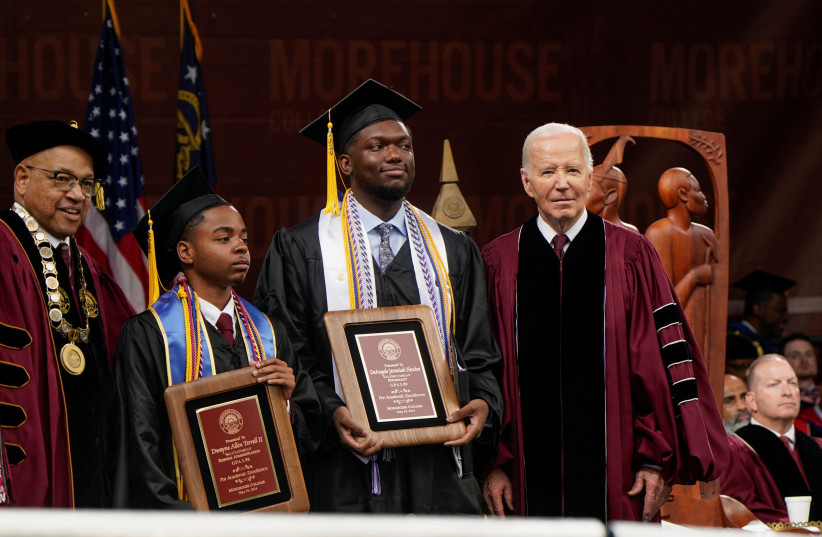US President Joe Biden called for a two-state resolution to the conflict as his National Security Advisor Jake Sullivan visited Israel to advance both a Saudi deal and a hostage deal.
“I’m working to make sure we finally get a two-state solution, the only solution for two people,” Biden said during a commencement address Sunday at Morehouse College in Georgia.
Sullivan met with Prime Minister Benjamin Netanyahu and Israeli President Isaac Herzog in Jerusalem after arriving from Saudi Arabia where he had spoken with Crown Prince Mohamed bin Salman.
On the table were the frozen talks for the remaining 128 hostages and humanitarian aid for Gaza.
Herzog in his conversation with Sullivan stressed the important role the United Arab Emirates and Cyprus have played in the maritime entry of aid, which began over the weekend, after the US set up a temporary pier.

The National Security Advisor also spoke with Israeli officials about the IDF’s pending military operation in Rafah, its second front against Hezbollah in the North, and the Biden administration’s efforts to forge a Saudi deal.
US goal of Israel-Saudi agreement
The Saudi Foreign Ministry said the sultan and the crown prince “discussed the nearly final version of the draft strategic agreement” which has “almost been finalized.”
That security pact against Iran is part of a three-part deal that would also include normalization between Saudi Arabia and Israel and a pathway to Palestinian statehood.
The Saudis have not wanted to move forward with a deal while the Gaza war is ongoing. The United States has increasingly favored a diplomatic solution to the war, possibly through its triad deal with Saudi Arabia.
It has also pressed Israel on the need for a “day-after” plan, for when the Gaza war is over. Netanyahu has yet to finalize such a plan. Minister Benny Gantz (National Unity) has threatened to leave the government unless such a plan is unveiled.
It’s a step that won’t bring down the government but would increase tensions between Israel and the United States. A coalition without Gantz would leave Netanyahu very little room to show flexibility toward US positions without risking the demise of his coalition.
Netanyahu and his coalition have opposed Palestinian statehood.
In a meeting with US Representative Elise Stefanik (R-NY), Foreign Minister Israel Katz called for “bipartisan support” against a Palestinian state, which he said would reward Hamas for its October 7 attack on Israel and would only serve as a base for that terror group and Iran to attack the Jewish state.
In Georgia, Biden told the college graduates at Morehouse that Palestinian statehood was an important part of the day-after plan for Gaza.
“What’s happening in Gaza and Israel is heartbreaking,” he said, as he recalled the trauma of the October 7 attack in which over 1,200 people were killed and 252 seized as hostages.
Biden spoke of his visit to Israel just nine days after the October 7 attack, where he had been shown visual evidence of how Hamas terrorists had bound a mother and daughter together and burned them alive, “watching them die.”
Biden also spoke of the trauma the Gaza war had wrought on the civilians in the enclave, explaining that these are “innocent Palestinians caught in the middle of all this.”
“These are men, women, and children killed or displaced and in desperate need of water, food, and medicine. There’s a humanitarian crisis in Gaza,” the president said.
He stressed that he was pressing for an immediate ceasefire that would bring home the remaining 128 hostages.
“We call for an immediate ceasefire, to stop the fighting and bring the hostages home,” Biden stated.
Efforts for such a deal have stalled, but, the president stressed, “I’ve been working on a deal as we speak, working around the clock to lead an international effort to get more aid into Gaza” and “rebuild it.”
“I’m also working around the clock for more than just one ceasefire, I’m working to bring the region together, to build a lasting durable peace,” Biden said.
He added, however, that the question is, what happens after the war: “What happens in Gaza; what rights do the Palestinian people have?”
Several students and faculty members had earlier called for the revoking of Biden’s invitation to speak over his Israel policies.
Some students wore keffiyehs – the black-and-white head scarfs which have become an emblem of solidarity with the Palestinian cause – tied around their gowns. A handful of students turned their backs to him in silent protest over the Gaza crisis.
Morehouse’s valedictorian also called for a permanent and immediate ceasefire, to which Biden applauded.
Reuters contributed to his report.
